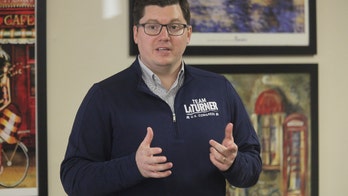
WASHINGTON – The Obama administration wants to spend just over half a billion dollars on Alzheimer's research next year, hoping to battle back against what could become the defining disease of the aging baby-boom generation.
Not all the spending must wait for approval from Congress: Under the plan being announced Tuesday, the National Institutes of Health will devote an extra $50 million to Alzheimer's research this year -- opening the possibility that at least one stalled study of a possible therapy might get to start soon.
"The science of Alzheimer's disease has reached a very interesting juncture," with promising new findings to pursue after years of false starts, NIH Director Dr. Francis Collins told The Associated Press. "We would love to be able to come up with a way of bringing forward an even larger amount of support."
The NIH currently spends $450 million a year on Alzheimer's research. In his budget proposal to be released next week, President Barack Obama will ask Congress for $80 million in new money for Alzheimer's research next year, Collins said.
The move is part of the administration's development of the first National Alzheimer's Plan, a congressionally-ordered strategy that will combine research toward better dementia treatments with steps to help overwhelmed families to better cope today. In addition to biomedical research, the administration said it will propose spending $26 million for other goals of the still-to-be-finalized plan, including caregiver support.
"We can't wait to act," Health and Human Services Secretary Kathleen Sebelius said in a statement. "Reducing the burden of Alzheimer's disease on patients and their families is an urgent national priority."
Patient advocates long have said the nation's spending on Alzheimer's research is far too little considering the disease's coming toll. At a meeting last month some of the government's Alzheimer's advisers said it could take a research investment of as much as $2 billion a year to make a real impact.
"Our country cannot afford not to make these commitments," Alzheimer's Association President Harry Johns told that meeting.
More than 5 million Americans have Alzheimer's or related dementias, and, barring a medical breakthrough, that number is expected to more than double by 2050. Today, medical and nursing home bills for Alzheimer's total about $180 billion a year, a tab expected to reach $1 trillion.
For comparison, the government spends nearly $3 billion on AIDS research; about 1.1 million Americans are living with the AIDS virus.
Given the nation's fiscal problems, it's not clear what the chances are in Congress for a boost in Alzheimer's funding.
But for this year, Collins said Alzheimer's is such a priority that the NIH will shift some of its budget from other research areas to eke out an extra $50 million right away.
Among his examples: Some cutting-edge gene-mapping will be directed to concentrate on uncovering the genetics of Alzheimer's, including what protects the brains of some people in dementia-prone families. Collins also said he will determine whether the extra money is enough to start some clinical trials that otherwise would have to wait, including one to test whether an intranasal form of insulin might reach and protect the brain cells of people with early dementia symptoms.




